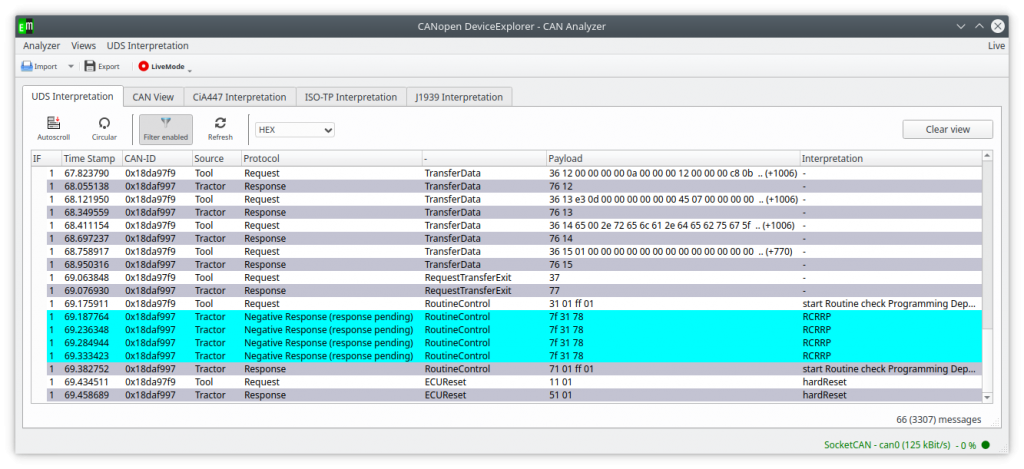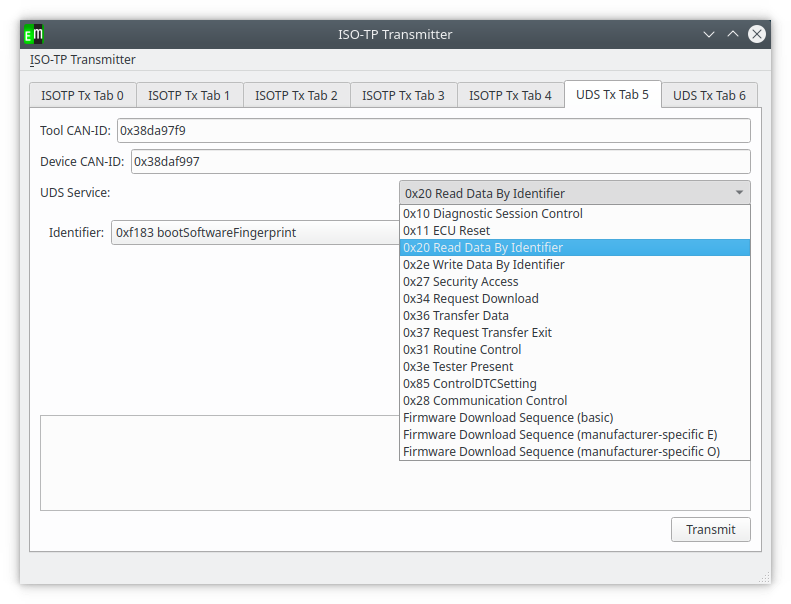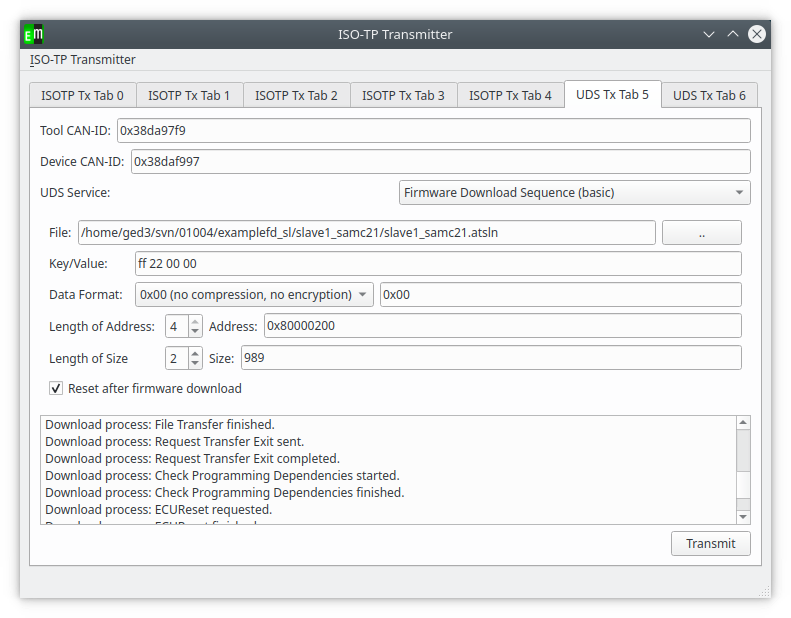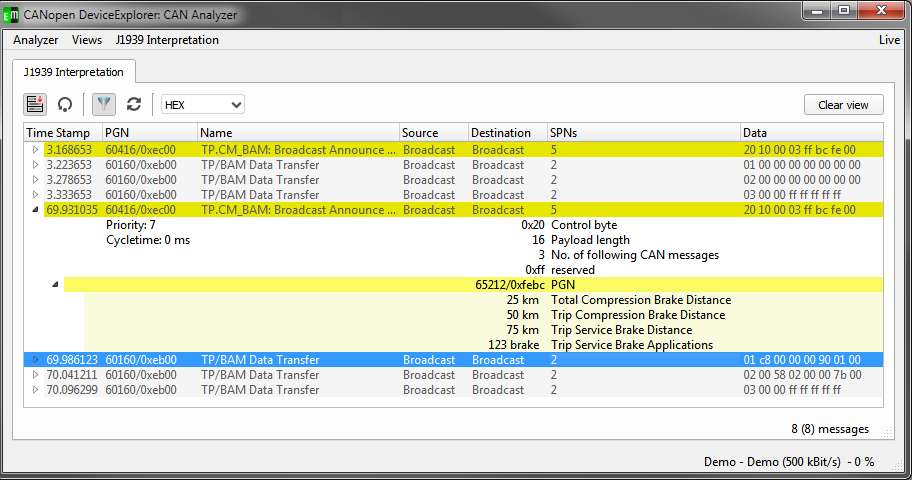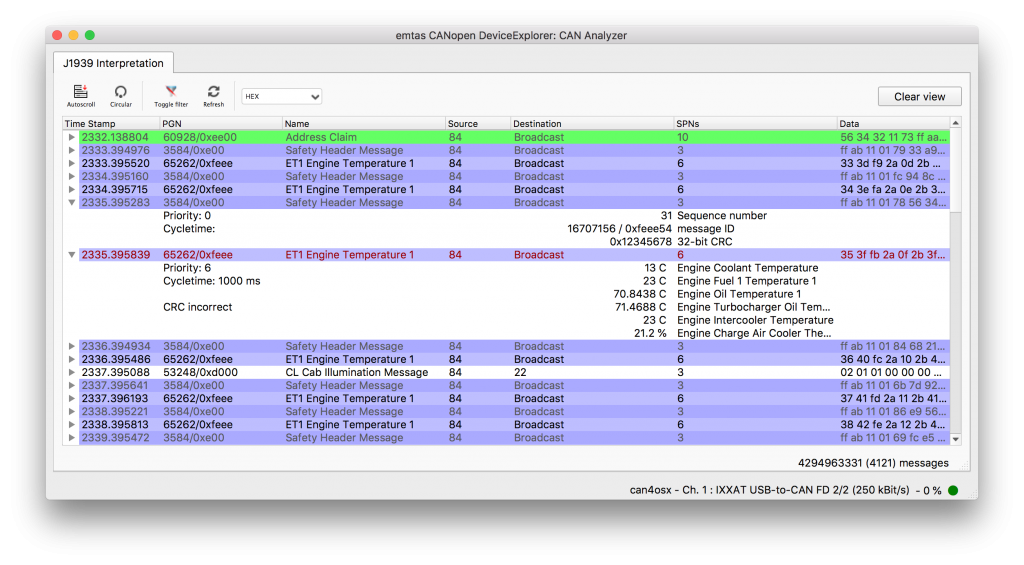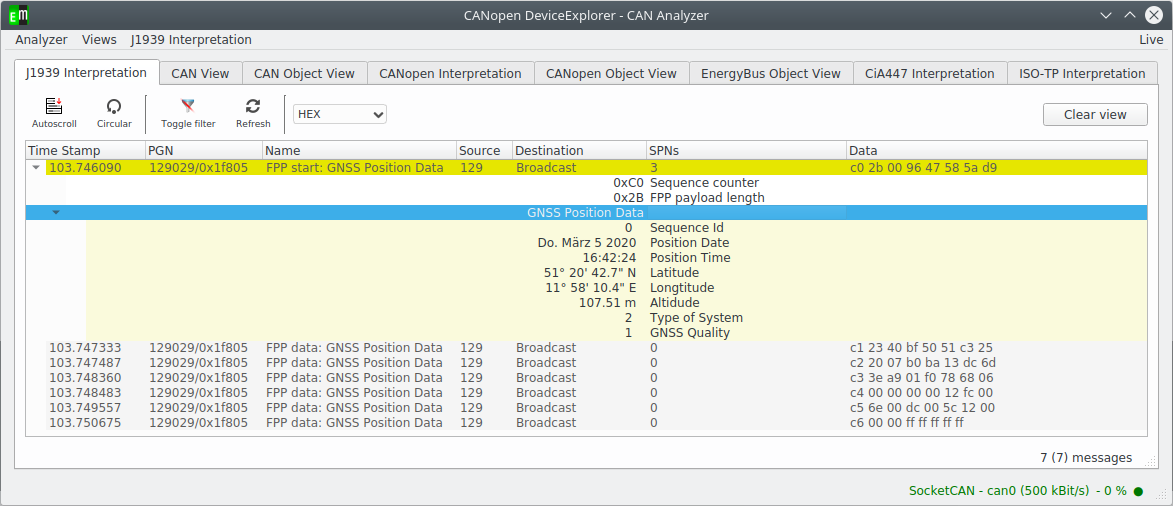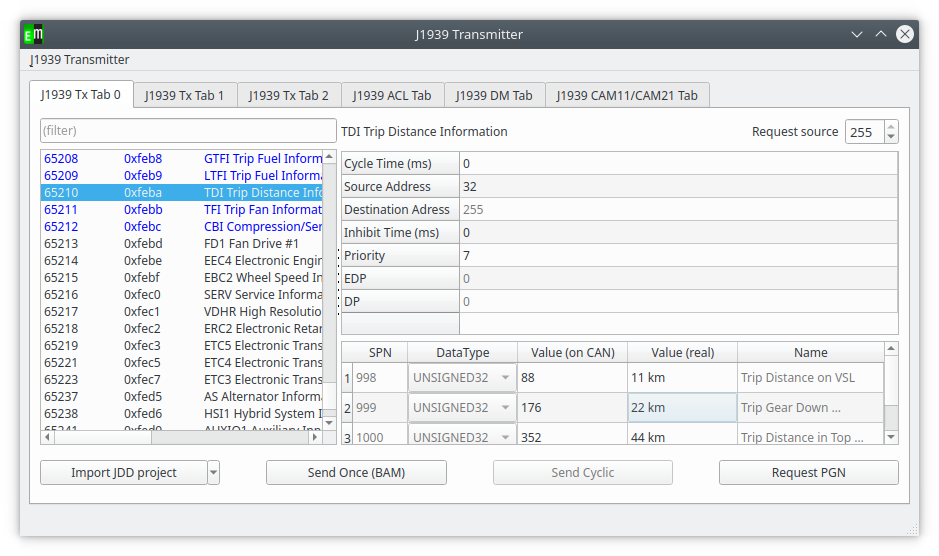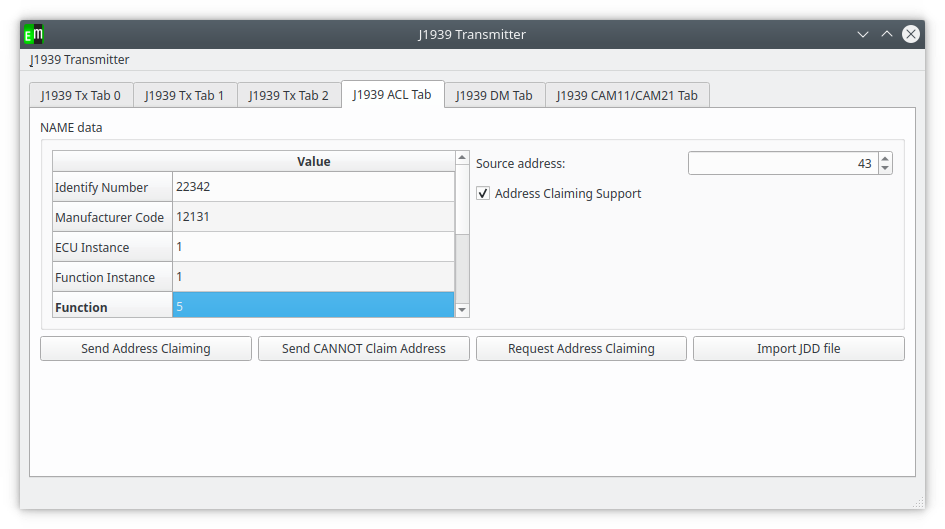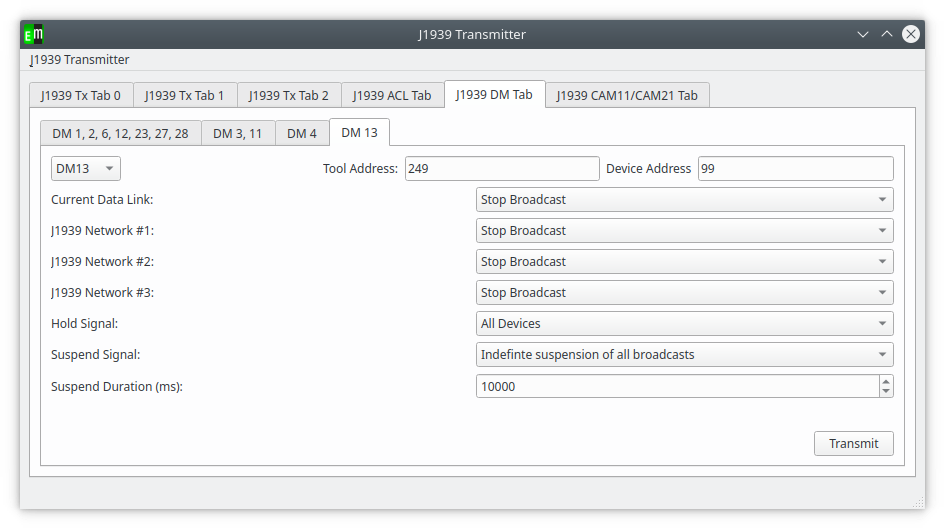// ARTICLE
<< Newsletter 2022-10-19 <<
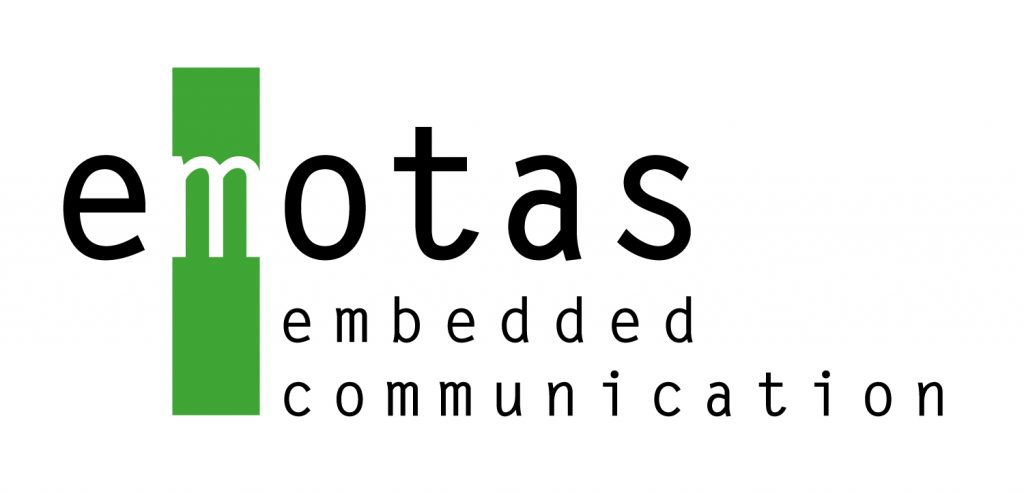
Dear customers,
we would like to inform you about latest events and products.
SPS – November 8th – November 10th Nuremberg, Germany (5-135)
After two years of virtual events, the SPS will take place again in Nuremberg. You can find us at our booth 5-135 located conveniently in one of the central halls. Our experts Andreas Boebel and Torsten Gedenk will be present all 3 days to answer you questions regarding CAN (FD), CANopen (FD), J1939 (FD) and UDS and how our products can help you with your development projects. If you like you may contact us in advance to arrange an appointment.
https://www.emotas.de/en/events/sps-2022
CANopen FD – protocol stack and tools
emotas offers powerful CANopen FD stacks and a complete CANopen FD tool chain including CANopen FD boot loaders. The CANinterpreter is a CAN-FD analyzer with a detailed CANopen FD interpretation. Its analyzing capabilities are additionally included in the CANopen DeviceExplorer. The CANopen DeviceExplorer is a versatile CANopen FD engineering tool that accelerates both the device development and trouble-shooting later. To design CANopen FD devices our CANopen DeviceDesigner is included in the scope of delivery of the CANopen FD stack. For a step-by-step migration from CANopen to CANopen the CANopen FD stack supports both protocols and one may choose one at the start of the devices.
https://www.emotas.de/en/produkte/canopen-fd-stack
UDS Stack extension with additional services
The usage of the Universal Diagnostic Services (UDS) is increasing continuously. Because of this we have added both an UDS server stack extension and an UDS bootloader to our product portfolio. Currently the UDS server extension covers the following services:
• 10h DiagnosticSessionControl
• 11h ECUReset
• 14h ClearDiagnosticInformation
• 19h Read DTC Information
• 22h ReadDataByIdentifier
• 23h ReadMemoryByAddress
• 27h Security Access
• 28h CommunicationControl
• 2Eh WriteDataByIdentifer
• 2Fh IOControlByIdentifer
• 3Dh WriteMemoryByAddress
• 31h RoutineControl
• 34h Request Download
• 35h Request Upload
• 36h Transfer Data
• 37h Request Transfer Exit
• 3eh TesterPresent
• 85h ControlDTCSetting
The UDS server extension can be used together with our CANopen stack, J1939 stack, RawCAN stack or CAN-MultiProtocol Stack.
https://www.emotas.de/en/can-software/uds-server-stack
Current versions of our stacks and tools (October 19th 2022)
CAN-MultiProtocol-Stack: 1.9.6
CANopen (FD) Stack: 3.9.6
J1939 (FD) Stack: 3.7.6
RawCAN Stack: 1.0.1
UDS Server Extension: 1.3.0
CANopen DeviceExplorer: 2.14.2
CANInterpreter: 1.12.2
CAN UpdateManager: 2.1.1
Customers within the support period may download the latest version any time using the license and update tool (LUT).
Best Regards
emotas embedded communication =>
// ARTICLE
<< Newsletter 2022-06-08 <<

Dear customers,
we would like to inform you about latest events and products.
After 2 years of virtual conferences, we are very happy to meet you personally again in person at the Embedded World fair in June in Nuremberg, Germany.
Embedded World – June 21th – June 23rd Nuremberg, Germany
The first real event this year will be the Embedded World fair in Nuremberg. We will exhibit as usual and are looking forward to meet you at our booth 4-119. Our CAN experts Andreas Boebel and Torsten Gedenk will be present all 3 days to answer you questions regarding CAN (FD), CANopen (FD), J1939 (FD) and UDS and how our products can help you with your development projects.
https://www.emotas.de/en/events/embedded-world-2022
RawCAN stack
The RawCAN stack is the foundation of our well-proven CANopen and J1939 stacks. It consists of a powerful CAN driver for various micro controllers and additional features such as an interrupt-driver transmit queue and receive queue, flexible filters and functions for cyclic transmission of CAN messages as well as reception monitoring and inhibit time handling.
https://www.emotas.de/en/can-software/rawcan-stack
UDS Stack extension
The usage of the Universal Diagnostic Services (UDS) is increasing continuously. Because of this we have added both an UDS server stack extension and an UDS bootloader to our product portfolio. The UDS Stack extension can be used together with our CANopen stack, J1939 stack, RawCAN stack or CAN-MultiProtocol Stack.
https://www.emotas.de/en/can-software/uds-server-stack
MadeForSTM32 v2
Not very new but important as ever: Our emotas CANopen Slave Stack for STM32Cube has been awarded with the MadeForSTM32 quality label version v2 by STM32Microelectronics. The product evaluation for the label was based on three pillars: a development process evaluation, a technical ‘hands-on’ evaluation and an evaluation of our support process to ensure a faster time-to-market.
https://www.emotas.de/en/produkte/canopen-slave-stm32cube
Best Regards
emotas embedded communication =>
// ARTICLE
<< Newsletter 2021-10-04 <<

Dear customers,
we would like to inform you about latest events and products. In particular we would like to invite you to the SPS fair to Nuremberg. We look forward to welcoming you again in person.
J1939 in the spotlight
To meet the rising demand for information about J1939 and J1939 FD, we would like to inform you about a webinar with Kvaser about J1939 October 20 and a full day J1939 remote seminar in English November 18th:
https://www.emotas.de/en/seminar/j1939-webinar
https://www.emotas.de/en/seminar/j1939-remote-training
SPS 2021 in Nuremberg November 23rd – 25th (booth 5-135)
Our experts Andreas Boebel and Torsten Gedenk are looking forward for your visit at our booth 5-135 at the SPS IPC Drives between November 23th and November 25th in Nuremberg, Germany. Our booth in located in the central hall 5. A free ticket for the fair is available at our web page.
https://www.emotas.de/en/events/sps-2021
UDS Stack extension
The importance of the Universal Diagnostic Services (UDS) is increasing continuously. Because of this we have added both an UDS server stack extension and an UDS bootloader to our product portfolio. The UDS Stack extension can be used together with our CANopen stack, J1939 stack, RawCAN stack or CAN-MultiProtocol Stack. The UDS Server stack will be complemented with an UDS Client stack in 2022.
https://www.emotas.de/en/can-software/uds-server-stack
J1939 FD stack
The J1939-22 specification for J1939 in CAN FD networks takes J1939 to the next level. Our new J1939 FD stack supports both J1939 on classical CAN and J1939 according to J1939-22 on CAN FD networks. In particular the new Multi-PG handling is supported and as well as the improved transport protocols that use the longer CAN FD frames.
https://www.emotas.de/en/produkte/sae-j1939-fd-stack
Best Regards
emotas embedded communication =>
// ARTICLE
<< J1939 Stack – CAM11/CAM21 Client/Server Extension <<

The J1939 parameter groups CAM11, CAM21 and CEM are defined in the J1939 Digital Annex to be used as CANopen Application Messages and CANopen Emergency Messages. The CANopen specification CiA 510 defines how to use these 3 PGs to use the classical CANopen SDO and Emergency protocol in J1939 networks.
In order to use these services within a J1939 device, we offer optionally a CAM11/CAM21 server or client extension for our J1939 protocol stack.
The CAM11/CAM21 Server Extension provides functions to implement an SDO server and a CANopen object dictionary in a J1939 devices. The object dictionary may start at index 0x2000 and the objects supports all CANopen features. Likewise all three SDO protocols (expedited, segmented and block transfer) are supported.
The CAM11/CAM21 Client Extension includes functions to use an SDO client and to read or write objects from another device that implements an SDO server using CAM11/CAM21.
Please contact us at service@emotas.de for additional questions.
For customers familiar with our CANopen stack we would like to emphasize that the API is the same as in our CANopen stack and all its SDO features can be used including SDO split indication (to delay an SDO response) or functions to handle large domains in smaller chunks for both the client and the server side. So especially a firmware download using CAM11/CAM21 is facilitated. =>
// ARTICLE
<< J1939 Stack – Safety Extension <<
J1939 Safety is an extension to the J1939 protocol. It is defined in SAE J1939-76 and provides methods to transmit and receive safety-critical data. The safety-critical data transmission can be on parallel to an existing J1939 transmission.
The J1939 Safety Extension is an extension for our J1939 stack and it provides methods to send and receive J1939 Safety Header messages and to ensure data consistency within a J1939 Safety Data Group.
To analyze J1939 Safety messages we recommend our J1939 interpretation plugin for the CANinterpreter or CANopen DeviceExplorer. =>
// ARTICLE
<< Newsletter 2021-02-10 <<

Dear customers,
we would like to inform you about latest events and products.
Due to the special situation this year most events – at least in the first half of the year – will be online events. The first event, is the embedded world digital which takes place between March 1st and March 5th and the second one is the international CAN conference will be take place June 14th to June 17th 2021. Would like to welcome you to meet us virtually at both events.
RawCAN stack
The RawCAN stack is the foundation of our well-proven CANopen- and J1939 stacks. It consists of a powerful CAN driver for various micro controllers and additional features such as an interrupt-driver transmit queue and receive queue, flexible filters and functions for cyclic transmission of CAN messages as well as reception monitoring and inhibit time handling.
https://www.emotas.de/en/can-software/rawcan-stack
UDS Stack extension
The importance of the Universal Diagnostic Services (UDS) is increasing continuously. Because of this we have added both an UDS server stack extension and an UDS bootloader to our product portfolio. The UDS Stack extension can be used together with our CANopen stack, J1939 stack, RawCAN stack or CAN-MultiProtocol Stack.
https://www.emotas.de/en/can-software/uds-server-stack
MadeForSTM32
Not very new but important as ever: Our emotas CANopen Slave Stack for STM32Cube has been awarded with the MadeForSTM32 quality label by STM32Microelectronics. The product evaluation for the label was based on three pillars: a development process evaluation, a technical ‘hands-on’ evaluation and an evaluation of our support process to ensure a faster time-to-market.
https://www.emotas.de/en/allgemein/madeforstm32
Best Regards
emotas embedded communication =>
// ARTICLE
<< CDE MultiLine functionality <<
Using the MultiLine functionality 2 or more CAN interfaces can be used simultaneously by the CANopen DeviceExplorer or CANinterpreter. Of course, a filter for specific CAN lines is possible.
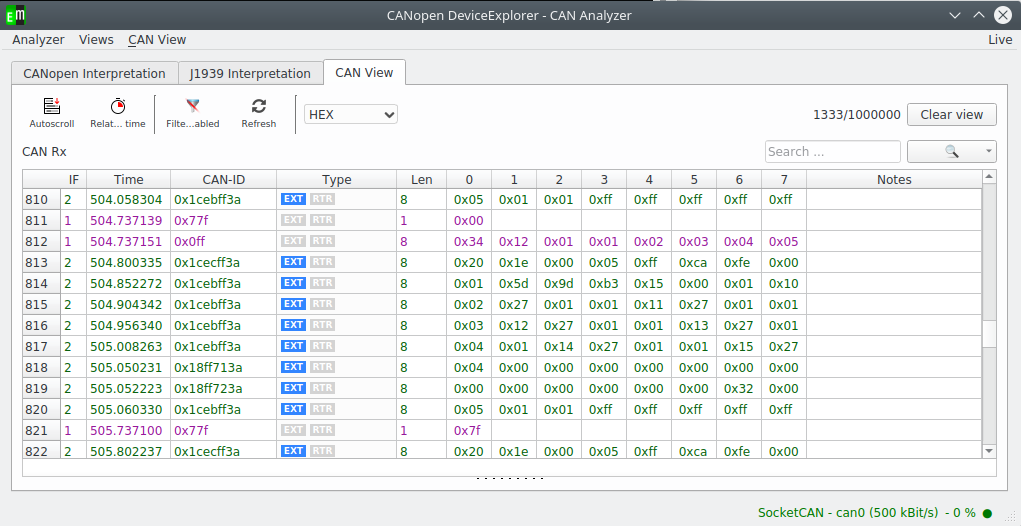 Multiple CAN lines in one view: CANopen and J1939 as raw CAN data (more…) =>
Multiple CAN lines in one view: CANopen and J1939 as raw CAN data (more…) =>
// ARTICLE
<< UDS PlugIn <<
UDS Interpretation
The UDS PlugIn is an optional extension for the CANopen DeviceExplorers and CANinterpreter to interpret UDS on CAN messages.
The underlying ISO-TP can be interpreted on the protocol layer.
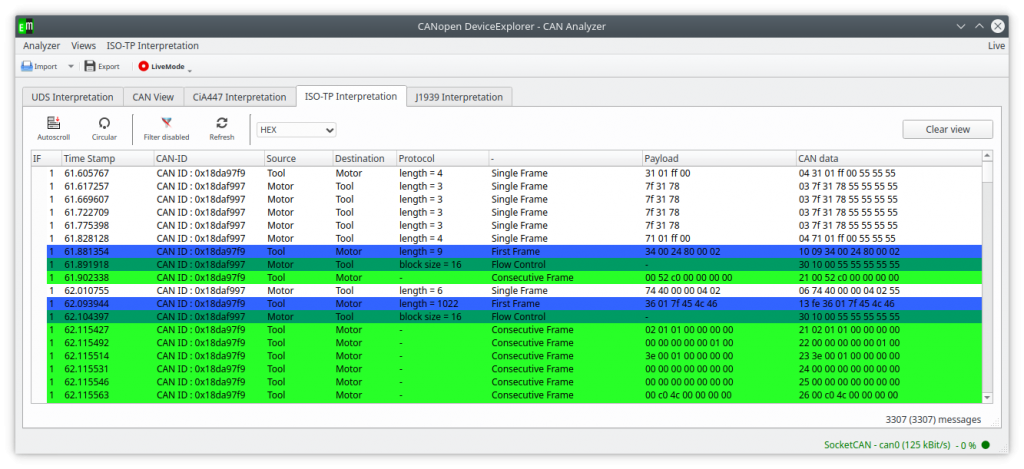
UDSonCAN messages are interpreted according the UDS specification.
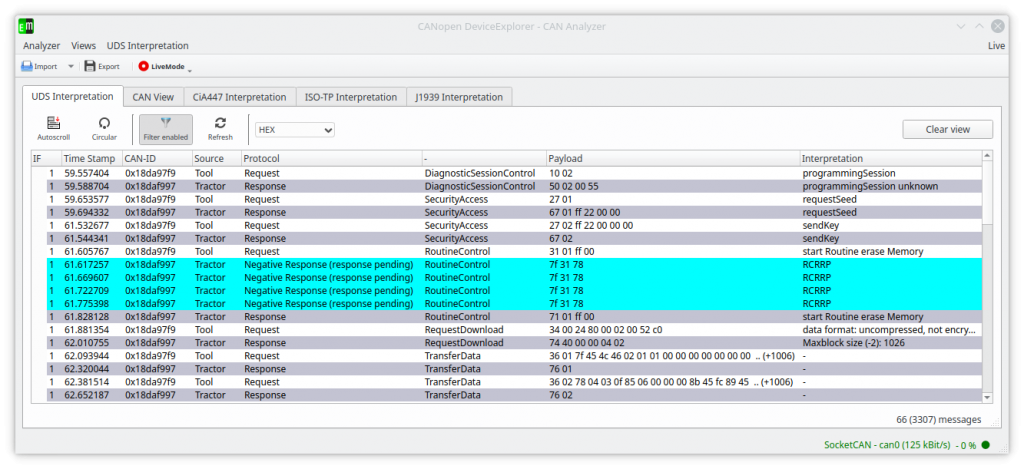
The payload of the TransferData services can viewed.
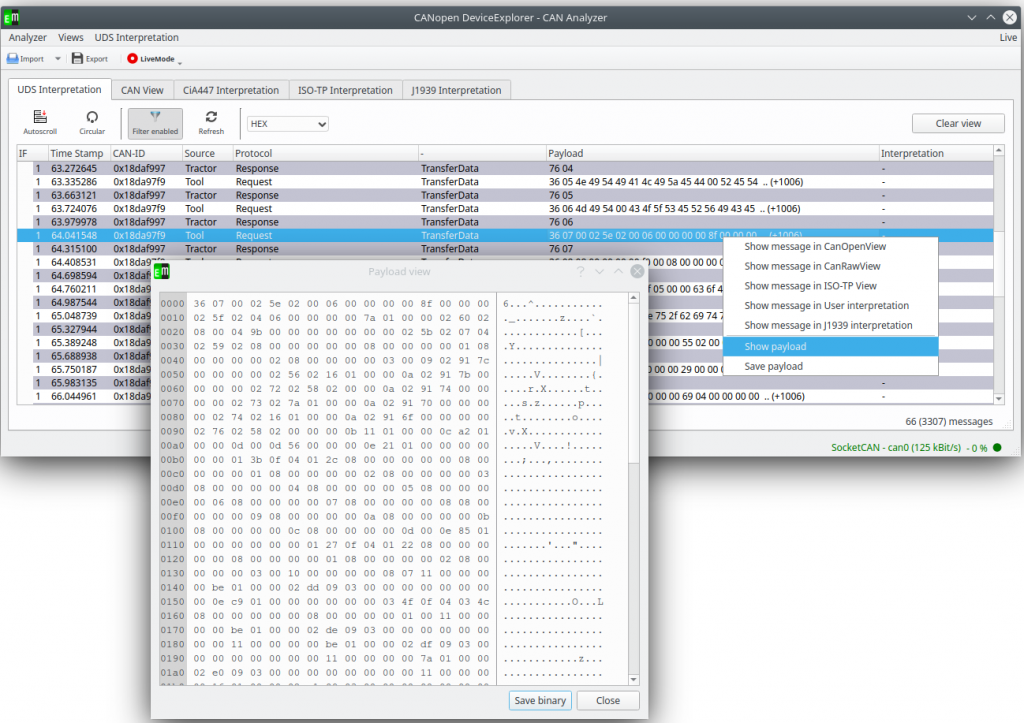
UDS Transmitter
The transmitter is able to transmit generic ISO-TP messages and complete UDS services. Additionally, complete download sequences are supported and even manufacturer-specific download sequences can be added to the tool.
Delivery/Licensing
- This features is optionally available for the CANopen DeviceExplorer and the CANinterpreter.
- See CANopen DeviceExplorer
- See CANinterpreter
Please contact us by mail service@emotas.de or phone +49(0)3461-794160 for any questions.
// ARTICLE
<< J1939 PlugIn <<
J1939 Interpretation
The J1939 PlugIn is an optional extension for the CANopen DeviceExplorer and CANinterpreter. It provides functions to interpret and to send J1939 messages. Selected SPN values can also be displayed in a chart.
The payload of the PGN are interpreted. BAM and TP.CMDT messages can be interpreted on protocol layer but the extension is also able to show the payload of these messages.
Safety Header Messages, NMEA2000 messages and diagnostic messages are also interpreted as shown in the images above.
J1939 Transmitter
The J1939 transmitter is able to transmit various J1939 messages. These are:
- Standard PGNs <= 8 bytes
- Request PGN and Address Claiming
- Broadcast PGNs > 8 bytes by BAM
- some diagnostic messages
- J1939 CAM11/CAM21messages
J1939 SPN Plotter (Chart)
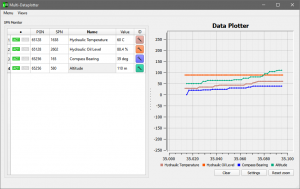
The SPN data plotter (chart) can be used to record and to visualize selected SPN values. The recorded SPN values can be exported afterwards and the chart supports SPN in ‘normal’ 8-byte-message but also SPNs that are transmitted via BAM, CMDT or Fast Packet Protocol (NMEA2000).
Delivery/Licensing
- This features is optionally available for the CANopen DeviceExplorer and the CANinterpreter.
- See CANopen DeviceExplorer
- See CANinterpreter
Please contact us by mail service@emotas.de or phone +49(0)3461-794160 for any questions.
// ARTICLE
<< Support definition <<
Support, training and consulting belong to our most important services that ensure a fast time-to-market. Especially the 6 or 24 months of included support that belong to our source code products enable a fast development with our products. Anyway, support does not include a CANopen training or a J1939 training nor detailed project specific consulting nor porting to other targets/environments. There we would like to explain the separate services:. (more…) =>
// ARTICLE
<< CDE MultiLine functionality <<
Using the MultiLine functionality 2 or more CAN interfaces can be used simultaneously by the CANopen DeviceExplorer or CANinterpreter. Of course, a filter for specific CAN lines is possible.
 Multiple CAN lines in one view: CANopen and J1939 as raw CAN data (more…) =>
Multiple CAN lines in one view: CANopen and J1939 as raw CAN data (more…) =>
// ARTICLE
<< J1939 Stack – Diagnostic Messages Extension <<
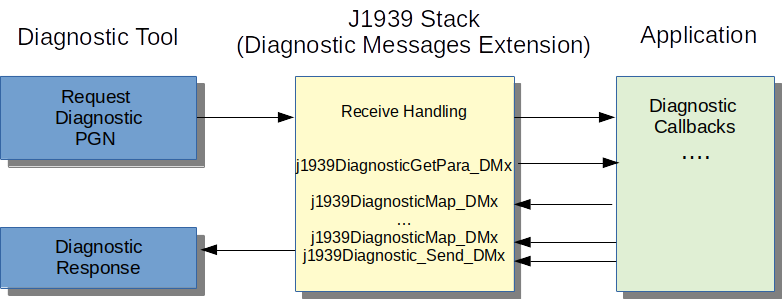
Diagnostic messages in J1939 are defined in the SAE specification J1939-73 and can be send and received with the emotas J1939 Stack. Without the Diagnostic Messages extension the Diagnostic Messages (DM) need to be interpreted by the application.
The Diagnostic Messages extension provides API functions to send and receive Diagnostic Messages (DM1 .. DM64) in a more easy way.
One example are functions that combine Diagnostic Trouble Codes (DTC) from SPN, Failure Mode Indicator, Conversion Mode and Occurrence Count and map multiple of them into a DM that is transmitted by BAM or CMDT. Another example are special functions for the memory access and binary data transfer using DM14, DM15 and DM16. =>
// ARTICLE
<< CANopen FD <<

CANopen FD
CANopen FD is the successor of the proven CANopen protocol specified in the CiA specification 1301. The basic principles of CANopen, such as the object dictionary, a parameter list for all process data and configuration values with a 16-bit index and an 8-bit sub-index for addressing, have been retained. Furthermore, defined services for the transmission of process data, configuration data, alarm notifications (emergency) and network management (NMT) are available. The maximum length of the process data objects (PDO) has been increased to 64 bytes in CANopen FD, so that longer CAN FD telegrams with several values or set-points can now be sent together in one telegram. In addition to increasing the data throughput, this makes it easier to synchronize related data – for example in multi-axis controllers. The previous SDO service for arbitrary access to all parameters and values in the object directory has been replaced by the new Universal Service Data Object (USDO) service. The USDO messages also use the full length of the CAN-FD telegrams. Furthermore, mechanisms for broadcast and routing via several CANopen FD networks have been integrated directly into the protocol. In addition, the length of the emergency messages has been extended and, among other things, time stamps and other information have been added.
emotas since the beginning on the standardization of CANopen FD
Since the beginning of the standardization of CANopen FD within CAN in Automation e.V., emotas’ employees have been active in the working groups. Already at the embedded world trade fair in 2015, emotas showed early implementation of the protocol at the CiA e.V. booth.
Available CANopen FD products
- CANopen FD StarterKit
- CANopen FD Stack (Slave, Master/Slave, Manager)
- CANopen FD Bootloader
- CANinterpreter with CANopen FD Support
- CANopen DeviceDesigner with CANopen FD Support
- CANopen DeviceExplorer with CANopen FD Support
// ARTICLE
<< CiA 309-3 Support (CANopen-TCP/IP-Gateway) <<
Anstelle eines CAN-Interface, welches direkt am PC angeschlossen ist, kann sich der CDE auch mit einem CANopen-TCP/IP-Gateway nach CiA 309-3 verbinden.
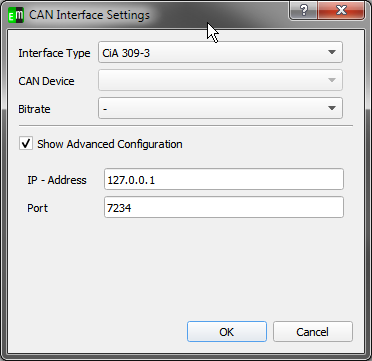
Rohe CAN-Daten können dabei nicht übertragen oder angezeigt werden, jedoch ist die Nutzung der CANopen-Funktionalität des Tools möglich. U.A. wie nachfolgenden dargestellt das Auslesen des Objektverzeichnisses per SDO. Zudem können NMT-Kommandos versendet werden, PDOs konfiguriert, gesendet und empfangen sowie LSS-Kommandos versendet werden.
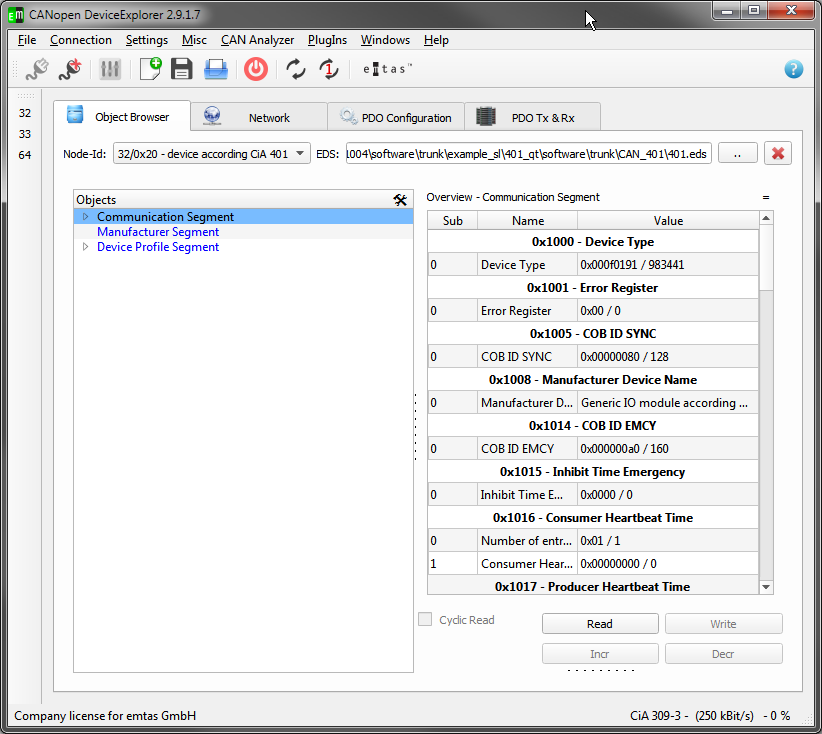
Der CiA-309-3 View zeigt die übertragenen CiA 309-3-Daten an.
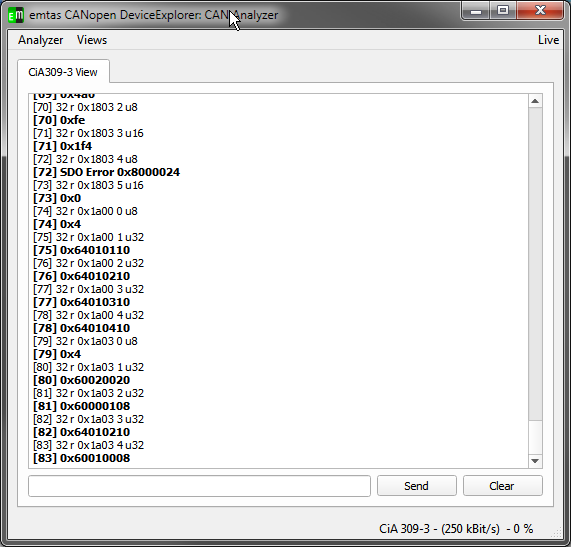 =>
=>
// ARTICLE
<< Source Code license terms for stacks and bootloaders <<
Site license
A site license allows the usage of the source code product at a defined development site by multiple developers at the development site. A development site is defined by a distinct address. If the development is done by a 3rd party such as a subcontractor or a software development company, this 3rd party may be included into the license agreement as a temporary user and the license can include the site of the development company as long as the 3rd party works for the licensee.
Unlimited projects, no project description disclosure
A site license is valid for an unlimited number of own projects and you don’t need to disclose the project description.
Duration
It is a perpetual, non-exclusive and non-transferable license. An unlimited number of own products of the licensee may be developed.
Support
A site license comes with 24 months of support for designated contact persons. The support period may be extended by an optional maintenance agreement.
Updates
Updates – if available – will be provided for 24 months. The update period may be extended by an optional maintenance agreement.
Additional CAN driver packages/Extensions
Additional CAN driver packages (for stacks only) or extensions (e.g. optional features) may be ordered later during the support/update period. The support period of any additional driver package or extension is based on the support period of the original stack.
Prohibition of passing on the source code
The source code may not be passed on to third parties.
run-time fees/royalties
There aren’t any run-time fees nor royalties.
Project license
A project license allows the usage of the source code product at a defined development site for a defined project. If the development is done by a 3rd party such as a subcontractor or a software development company, this 3rd party may be included into the license agreement as a temporary user and the license can include the site of the development company as long as the 3rd party works for the licensee.
Duration
It is a perpetual, non-exclusive and non-transferable license which is limited for a specific project only. The project needs to be defined in advance with a micro controller type (e.g. STM32F3), a planned product name and a short description.
Examples could be:
- SafeCharge 42 – EnergyBus charger based on a XMC1404-Q064
- GluppClean 2025 – Robot for canal inspection using a STM32H743
- TPS-J1939 – Temperature and pressure sensor with J1939 interface based on a dsPic33ev
- RnD project “seed uav” with UDS stack based on STM32G4
- Réaumur 30 – temperature sensor with propritary CAN protocol implemented using RawCAN stack on RH850/F1K
Support
A project license comes with 6 months of support for designated contact persons. The support period may be extended by an optional maintenance agreement.
Updates
Updates – if available – will be provided for 6 months. The update period may be extended by an optional maintenance agreement.
Additional CAN driver packages/Extensions
Additional CAN driver packages or extensions (e.g. optional features) may only be ordered with an additional project license.
Prohibition of passing on the source code
The source code may not be passed on to third parties.
run-time fees/royalties
There aren’t any run-time fees nor royalties.
The information above are for information only. Only the license agreement itself is valid. You may get the template of the license agreement in advance or it will be sent along the quotation.
There are different licenses for our software tools. =>
// ARTICLE
<< CDE Scripting PlugIn <<

The CDE scripting plugin provides a Javascript based scripting API with 50+ additional CAN/CANopen commands. Own graphical user interfaces (GUI) can be designed and used as well in these scripts.
(more…) =>
// ARTICLE
<< SRDO PlugIn <<
The SRDO PlugIn is a powerful PlugIn for the CANopen DeviceExplorer. It simplifies the configuration of SRDO producers and SRDO consumers in a CANopen Safety network. The SRDO settings and the SRDO mapping of specific devices can be configured in a straight-forward way. (more…) =>
// ARTICLE
<< Newsletter 2017-06-07 <<

Dear reader,
emotas’ opinion counts. Since many years the software engineers of emotas has been taking part at the CAN in Automation e.V. working groups with know-how to forward the standardization of CANopen. The result are innovative products which are made just for you.
emotas’ successful commitment at the CAN in Automation e.V.
Our expert Steffen Rose is currently managing the ‘CANopen JTF CiA/EnergyBus: Energy management systems (EMS)’. Together with EnergyBus e.V. they define the CiA-profile 454 (EnergyBus) for energy management systems in light electric vehicles (LEV). Andreas Boebel and Alexander Philipp are involved in further development of CANopen FD at the working groups ‘IG CANopen’ and ‘SIG application layer’. In this group first multi vendor demo networks by using the new USDO service has been shown. Furthermore emotas has already realized CANopen FD solutions on different embedded platforms. Besides EnergyBus Steffen Rose is supporting the ‘SIG application layer TF security’ focusing on security issues concerning CAN, CANopen and CAN FD. Torsten Gedenk is supporting the ‘SIG application layer TF CiA 309/TF IoT’ with his knowledge of gateways from Internet to CANopen networks. So emotas’ experts are taking part at all currently important working groups dealing with the issues CANopen, CANopen FD, EnergyBus and contiguous topics. Last but not least emotas has been elected by the general assembly of the association members to the Business Committee of the CiA e.V.
These different technical working groups of the CiA e.V. we also consider as a platform for your interests. Please do not hesitate to contact us. We can represent you on-site.
More memory areas for the CANopen Boot loader
The emotas’ CANopen Boot loader is supporting the segmented SDO transfer as well as the SDO block transfer. What’s new is the support for several memory sections, which can be written individually by the 0x1f50 object.
These different memory areas may be include an application and several independent data sections. It is therefore possible to update calibration data or configuration data via the boot loader separated from the application. The access to the CANopen Boot loader according to CiA302 is possible with every CANopen Master. Of course, all current versions of our tools like CANopen DeviceExplorer and especially the CANopen UpdateManager are supporting the access to the additional memory areas.
https://www.emotas.de/en/produkte/canopen-bootloader
News of our stacks and tools
Version 2.7 of the CANopen stack includes updates and improvements concerning individual CAN drivers. For example the MultiCAN driver of the XMC4000 family: it has been upgraded with a bus-off-identification according to Errata MultiCAN_AI.H007. Concerning the driver for the AT90CAN128 we were able to reduce the interrupt time. With immediate effect the SAM C21 of Atmel is supported, too. Additionally, the multi-line variant now supports the separate initialization of single lines and the SDO-Client-Queue supports the transfer of data from the server’s object dictionary into the client’s one.
https://www.emotas.de/en/produkte/canopen-slave-stack
The latest version of 2.7 of the EnergyBus LEV Framework includes all upgrades of the CANopen stack. Additionally the framework and the EnergyBus DeviceWizard does support manufacturer specific devices as slave or inside the EBC.
https://www.emotas.de/produkte/energybus-framework
Version 2.6.2 of the CANopen DeviceExplorer now supports further scripting commands and the work on greater projects in the DataLinker add-on has been sped up.
https://www.emotas.de/en/produkte/canopen-device-explorer
save the date! – coming in fall
You are invited to take part at our public training for J1939, CANopen and EnergyBus in Merseburg on 24th, 25th and 26th October. Please do not hesitate to register now.
https://www.emotas.de/en/events/schulungstermine
Let’s meet at the SPS IPC Drives in Nuremberg.
From 28th until 30th November 2017 you’re invited to use the opportunity to see our products live at the booth 125 in hall 6.
https://www.emotas.de/en/allgemein/sps-ipc-drives-2017
With kind regards
your emotas team =>
// ARTICLE
<< Supported Controllers <<
Following chip manufacturers and their families are supported at the moment by our CANopen (FD), EnergyBus and J1939 stacks:
| Manufacturer | Types |
| ATMEL (Microchip) | ATmega64C, AT90CAN64, AT90CAN128, SAM C21, SAM E54, SAM V71 |
| BOSCH | C_CAN, D_CAN, M_CAN |
| DCD | DCAN FD |
| Espressif | ESP32 |
| NXP | Kinetis, S12Z, i.MX6 (Linux), MPC560x, KEAZ128, S32K146, LPC15xx, LPC17xx, LPC40xx, LPC55Sxx, LPC546xx |
| Infineon | XMC4000 (ARM Cortex-M4, MultiCAN), XMC1400 (Cortex-M0) |
| Intel | x86 Architecture |
| Microchip | dsPIC33, PIC24H, PIC32MK |
| NuvoTon | NUC130, NUC140 |
| Renesas | RL78/F14, RX62, RX63N, RX65N, V850E2, RH850/F1L, RH850/F1KH-D8, Synergy S1,S3,S5,S7 |
| ST Microelectronics | all STM32 (ARM Cortex-M0, Cortex-M3, Cortex-M4, Cortex-M7, bxCAN, M_CAN), SPC570S |
| Texas Instruments | TMS320, C2000, TMS570 (Hercules), Tiva TM4C129, Sitara AM335x, MSPM0G3xxx M_CAN |
| LINUX systems | can4linux, SocketCAN, ECI |
| Windows (x84-64) systems | various CAN interfaces |
The table only lists the families. All providers offer within each family a large number of “family members” that differ in periphery, maximum clock rate or size of housing. In consequence the number of pins and pin assignment also differ.
The protocol stacks can be used with the following compilers and/or IDEs:
- gcc,
- ARM Keil Compiler,
- IAR Embedded Workbench by IAR Systems,
- Atmel Studio,
- STM32CubeIDE,
- Atollic True Studio,
- MPLAB X,
- Renesas e2Studio with Renesas Compiler
- Green Hills Compiler
- Code Composer Studio,
- MCUXpresso,
- S32 Design Studio
and more. (Not all compilers can be used with all targets, so please inquire in advance for specific CPU/compiler combinations.)
. =>
// ARTICLE
<< Newsletter 2017-02-15 <<

Sorry, this newsletter is only available in German language. =>
// ARTICLE
<< Newsletter 2016-11-03 <<

Sorry, this newsletter is only available in German language. =>
// ARTICLE
<< Licenses for Tools <<
Licenses for PC Tools
There are various license models for our PC tools for Windows or Linux. Below you can find a summary of the variants but only the included license text is binding. Each license is valid for any supported operating system as long as technically possible. The most limiting factor is the availability of CAN interface drivers for the various operating systems.
Named User License
A Named User License is valid for a named individual. This individual is allowed to use the tool on any PC. The name of the individual is always visible in the status bar of the tools. The license is perpetual for the licensed version of the tool.
In justified individual cases it is possible to transfer the named user license to another individual for a fee. Please contact our sales team for details.
A named user license of a CANopen-, EtherCAT or J1939 DeviceDesigners is included with the project licenses of our stacks or frameworks.
Node-Locked License
A node locked license is only valid for a single computer and it is tied to its MAC address. The tool may be used by multiple users of the licensee (company, organization) at this single computer. A usage within virtual machines is not allowed, but access to this computer using a remote desktop connection is allowed.
Floating dongle License
A floating-dongle license is delivered with an USB dongle. The license can be used with by anybody (employee of the licensee) on any machine together with this USB dongle. The price of a floating license is 30% higher than the other licenses. The floating license may be used inside of virtual machines and via remote desktop connections.
Site License
A site license of a tool is valid for a defined development site of a company. This site is defined by a unique address. Users that are assigned permanently to a specific site may also use the tool when working from home or on temporary business trips.
Such a site license usually costs 10 times the price of a Named-User license. Please contact our sales team for detailed information.
Corporate License
A Corporate license may be used by all employees of a company including all subsidiaries which are owned by the licensee with more than 50% of the shares.
Please contact our sales team for detailed information.
Other license models
Please contact our sales team if these licenses models do not meet your requirements to discuss individual solutions.
With an individual agreement we can provide buy-out licenses of our tools that may be forwarded to 3rd parties. These buy-out licenses are usually tied to a certain characteristic of the licensee. For CANopen it could be that there always needs to be at least 1 single device in the network, which is manufactured by the licensee and the tool will check the CANopen-Vendor-ID. For J1939 tools could be locked to a SAE manufacturer ID. Anyway, these conditions can only be discussed individually. On the other end of the range there are also time-limited licenses of our tools for start-ups available.
A floating-dongle license of a CANopen-, EtherCAT or J1939 DeviceDesigners is included with the site licenses of our stacks or frameworks. =>
// ARTICLE
<< CANopen Profiles <<

CANopen Profile
CAN in Automation e.V. defines a large number of CANopen device or application profiles that specify the interface and behavior of certain devices.
Device profiles define all communication properties and the behavior of a certain device class (e.g. IO devices or batteries). This includes a number of mandatory or optional parameters with their data types, access rights and values ranges as well the default PDO mapping.
The application profile defines a complete application that consists of multiple CANopen devices. An example is an electric bicycle that contains of a drive controller, a main controller, a battery, a display or a temporary charger. Another application profile covers a complete lift system. Besides the devices also the communication connections (PDO Linking, PDO COB Assignment) between the devices are defined by these CANopen application profiles.
CANopen Profile Support
We offer extensions to support the functionalities of these profiles and to provide the data and events to the application in a preprocessed way. Currently extensions for the following profiles are available:
(more…) =>
// ARTICLE
<< Newsletter 2016-09-051 <<

Sorry, this newsletter is only available in German language. =>
// ARTICLE
<< CiA 447 – CANopen profile for special-purpose car add-on devices <<
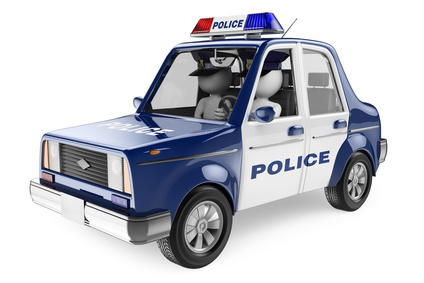
Overview
This profile standardizes the electronic interfaces of the add-on equipment for special-purpose passenger cars such as taxis, police cars, emergency vehicles, vehicles for handicapped persons etc. Use of CiA 447 allows the car manufacturer to choose add-on devices (e.g. taximeter, roof bar, camera) from various suppliers.
From CANopen point of view there are some points to consider:
- The number of nodes within the network is limited to 16.
- Node Id assignment is done by LSS FastScan.
- A special sleep- and wake-up-mechanism is used.
- SDO communication works with cross links, that allow each device to communicate via SDO with each other device of the network.
- PDO communications are pre defined as in all application profiles.
- Some CAN-Ids are reserved for UDS and ISO-TP.
Further information on the profile are available at CAN in Automation e.V.. It is available for free download for CiA members.
Extension modules for CANopen Stacks
For emotas CANopen Slave Stack and CANopen Master/Slave Stack there is an extension module available that helps with the development of CiA 447 slaves and masters.
Diese Erweiterung beinhaltet neben dem im Standardlieferumfang enthaltenen LSS:
- Sleep- and wake-up handling acc. to CiA 447
- Automatic SDO configuration for cross linked access
- Automatic PDO-COB-ID configuration acc. to CiA 447
- Functions to scan network acc. to defined boot up procedure (Master)
- Examples for master and slaves
- ISO-TP support for clients and servers included with CANopen stack
The extension module is available for all microcontrollers supported by emotas. As counterparte during the developments we recommend the software tool CANopen DeviceExplorer with LSS-Master-PlugIn and CANopen interpretation of CAN messages.
For questions, pricing and ordering information contact us by phone +49 (0)3461-794160 or service@emotas.de
// ARTICLE
<< CiA 443 – Device profile for sub sea instruments (SIIS Level-2) <<
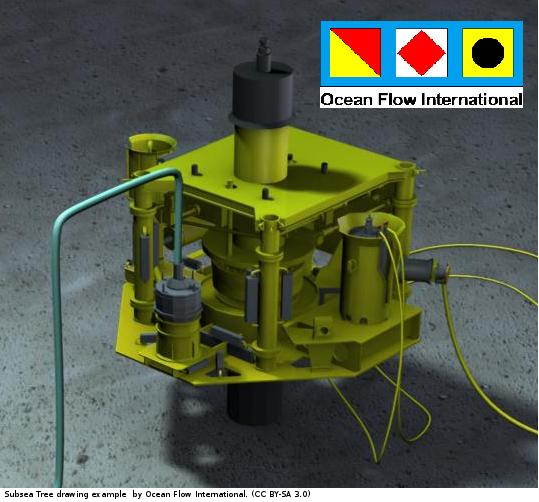
Overview
The CiA 443 device profile specifies instruments and actuator devices for subsea measurement systems. Subsea instruments include simple pressure and temperature sensors and complex multi-purpose instruments such as multiphase flow meter. Subsea actuators include simple valves and valve controller units.
SIIS-Level-2 Masters are not described in the profile, but must support the described features of the slaves and they must provide the needed services.
From the CANopen point of view the profile includes some points to consider:
- Each device needs a bootloader to update firmware.
- Each device boots up in the bootloader, the master activates the application separately.
- The bootloader must support LSS and automatic acknowledgement of bit rates.
- Node IDs are assigned by LSS.
The fact that fault tolerant CAN transceivers are to be used is independent from the CANopen implementation, but relevant for device development. For this, bit rates of 50 kbit/s and 125 kBit/s are supported. CAN-High-Speed transceivers with up to 250 kbit/s are possible optionally.
More information on the CiA443 profile are available at CAN in Automation e.V.. It is available for free download for CiA members.
Extension module for 443 profile for CANopen Slave Stack
For the CANopen Slave Stack emotas offer an extension that allows an easier development of CiA 443 devices.
This extension module includes a bootloader template suitable for CiA 443 and it supports the features of the application defined in the profile. TPDOs are sent automatically according to mapping and defied rules. The extension module matches with version 3.0.1 of the CiA 443 specification.
As counterparte during the developments we recommend the software tool CANopen DeviceExplorer with LSS Master-PlugIn. If wished emotas could also do the integration of CANopen and CiA 443 as an engineering service for you.
To connect SIIS-Level-2 Masters with upper level controlling platform the CiA 309-3 Server can be used.
For questions, pricing or odering information contact us by phone +49 (0)3461-794160 or e-mail service@emotas.de
// ARTICLE
<< Newsletter 2016-05-11 <<
Dear customer,
With our second newsletter this year we would like to invite you to be our guest at the All About Automation in Friedrichshafen. Visit us at our stand A2-419 from 2016-06-07 to 2016-06-08.
EtherCAT DeviceExplorer and EtherCAT Slave Framework
Our EtherCAT Slave Framework now supports additional controllers e.g. Infineon’s XMC4800 and Microchip’s LAN9252. Several ready-to-run EtherCAT slave examples are available for download at https://www.emotas.de/en/download/ethercat . In addition to our EtherCAT Slave Framework the EtherCAT DeviceExplorer can be used as a powerful EtherCAT master tool for the develop and test of EtherCAT slaves. The tool is available for Windows and Linux and can be used with standard Ethernet cards.
https://www.emotas.de/en/produkte/ethercat-device-explorer
Stack and Tool News
The CANopen Stack in version 2.6 comes with many updated features. In particular the SRDO handling and the SDO routing via CANopen gateways has been improved. Additionally, we can provide an example using TI-RTOS now and the list of support CiA profiles and supported micro-controllers has been extended. https://www.emotas.de/en/produkte/canopen-slave-stack
The CANopen Bootloader is now optionally available with SDO Blocktransfer. This improves the speed of the firmware download significantly when using a high CAN bitrate and CAN-USB interfaces.
https://www.emotas.de/en/produkte/canopen-bootloader
Our J1939 Stack in version 1.3 can now be used together with the J1939 DeviceDesigner.
Version 2.4.1 of the CANopen DeviceExplorers comes with a lot of improved details. Especially the interpretation of CANopen messages and the plug-in to configure SRDOs has been extended.
https://www.emotas.de/en/produkte/canopen-device-explorer
All About Automation Friedrichshafen – Stand A2 – 419
Meet our experts during the All About Automation fair (2016/06/07 to 2016/06/08) in Friedrichshafen, Germany. We look forward to welcoming you there. A free ticket is available at https://www.emotas.de/en/allgemein/aaa-friedrichshafen
With kind regards
Yours emotas team =>
// ARTICLE
<< Newsletter 2016-02-09 <<
Dear customer,
With our first newsletter this year we would like to invite you to be our guest at the Embedded world in Nuremberg. Visit us at our stand in hall 4-125 from 2016-02-23 to 2013-02-25.
EtherCAT DeviceExplorer and EtherCAT Slave Framework
The EtherCAT Slave Framewrok now supports Infineon’s XMC4800 and Microchip’s LAN9252. Additionally, we present our EtherCAT DeviceExplorer. The tool complements our EtherCAT Slave Framework. The EtherCAT DeviceExplorer is a multipurpose EtherCAT master tool for development and test of EtherCAT slaves. The tool is available for Windows and Linux and can be used with standard Ethernet cards.
https://www.emotas.de/en/produkte/ethercat-device-explorer
EnergyBus and CANopen – Training in Merseburg
EnergyBus is the open standard for electronic components in electric bikes and other Light-electric-vehicles (LEVs). As well mechanical elements as the communication via CANopen is standardized in the CANopen profile CiA-454.
To match the rising requirement for information on EnergyBus emotas offers trainings on EnergyBus in Merseburg on 2016/04/21. The training is are given in German language.
The day before there will be a CANopen training at the place:
https://www.emotas.de/en/allgemein/canopen-und-energybus-schulung
Stack and Tool News
The latest version 2.5 of our CANopen Stack supports now CANopen-Routing and the CiA443 extension has been improved. Additionally, we have extended the list of supported CiA profiles and microcontrollers.
https://www.emotas.de/en/produkte/canopen-slave-stack
CANopen DeviceDesigner and J1939 DeviceDesigner are available now in Version 2.4.
A number of improved details, especially for the interpretation of CAN messages and in the CiA 402 plugin are part of CANopen DeviceExplorer version 2.3.5
https://www.emotas.de/en/produkte/canopen-device-explorer
Besides Windows and Linux, all our tools will be available for MAC OS X in March 2016.
Embedded World 2016
Meet our experts during the embedded world trade show (2016/02/23 to 2016/02/25) in Nuremberg, Germany. We invite you to meet Andreas Boebel and Torsten Gedenk all days at our stand 4-125, Steffen Rose will be available on Wednesday. We look forward to welcoming you there!
With kind regards
Yours emotas team =>
// ARTICLE
<< Newsletter 2015-11-11 <<
Dear Sir or Madam:
With our 4rd newsletter this year we would like to invite you to visit us at our booth at SPS IPC Drives in Nuremberg, Germany where we will present our latest products from November 24th to 26th .
CANopen NetworkDesigner – Network design and simulation in one tool
We will launch the CANopen NetworkDesigner at SPS IPC Drives. The tool allows users to design complete CANopen networks including all devices and communication. It even generates the needed source code for all nodes automatically.
Devices, their signals and communications (via PDO and MPDO) are defined in the CANopen NetworkDesigner. The tool generates the source code for all components in the network. The CANopen NetworkDesigner and the emotas CANopen Stack lead to a CANopen compliant implementation of your project. A Simulation of not yet available devices is integrated in the tool.
https://www.emotas.de/en/produkte/canopen-networkdesigner
CAN MultiProtocol Stack für CANopen, EnergyBus, J1939 and your protocol
The CAN MultiProtocol Stack is able to manage different CAN based protocols within one device. Based on our uniform CAN driver API and the universal CAN queue the MultiProtocol Stack supports CANopen, EnergyBus, J1939, “raw” CAN and your protocol within one application.
For users that are already using one of our Stacks the API stays the same but now they can also easily integrate additional protocols like CANopen or J1939 into their application. Proprietary protocols can also be integrated by customers – or you ask us to do it. With our expertise in communication we can help you in a fast and cost saving way. Our CAN DeviceDesigner allows the automated design of devices for all supported protocols.
https://www.emotas.de/en/produkte/canmultistack
CANopen DeviceExplorer with additional features
The latest version of the CANopen DeviceExplorer supports SDO routing according to CiA302-7 and comes with a new optional extension to control
CANopen drives that follow the CiA402 specification. Again, the performance of the CAN interpretations extensions has been improved.
Additionally, the CANopen DeviceExplorer supports the new CAN-FD capable USB and PCI interfaces from Kvaser.
https://www.emotas.de/en/produkte/canopen-device-explorer
EtherCAT Slave Framework and Tools
Our EtherCAT tool chain, which consists of the EtherCAT Slave Framework, the EtherCAT DeviceDesigner and the EtherCAT DeviceExplorer has been improved continuously. The EtherCAT DeviceDesigner supports now the usage of modules, slots and enums. So even modular devices may be designed using the EtherCAT DeviceDesigner. Microchip’s LAN9252 and Infineon’s XMC4800 with integrated ESC are supported as well by our products.
https://www.emotas.de/en/info/ethercat-software-tools
SPS IPC Drives in Nuremberg – 11/24 – 11/26 – booth 2-300
From November 24th to November 26th you can meet our experts on the SPS IPC Drives trade fair in Nuremberg, Germany. They would be glad to welcome you on our booth 2-300. You are welcome to make an appointment with Andreas Boebel or Torsten Gedenk who will be available all days. On Tuesday and Wednesday also Katja Heinrich will be there to discuss your latest projects and inform you on our products. Our EtherCAT expert Martin Ritz is available at the EtherCAT joint booth.
https://www.emotas.de/en/allgemein/sps-ipc-drives-2015
With kind regards
Yours emotas team =>
// ARTICLE
<< Newsletter 2015-10-07 <<
Dear Sir or Madam:
With our 3rd newsletter this year we would like to inform you about our latest events.
CANopen training in Merseburg, Germany: 10-27-2015
The training is designed for development engineers as well as for decision
makers who want to get an overview over CANopen or want to use it as basis
to work with emotas products. The training will be given in German language.
https://www.emotas.de/en/allgemein/canopen-und-energybus-schulung
EnergyBus training in Merseburg, Germany: 10-28-2015
EnergyBus is the open standard for light electric vehicles (LEV) like
e-bikes for example. During this seminar Beate Overbeck (EnergyBus e.V)
will talk about motivation to develop and apply EnergyBus.
The focus of the training lies on technical specifics of the CANopen based
EnergyBus protocol.
https://www.emotas.de/en/allgemein/energybus-seminar
CiA CAN FD Tech Day in Frankfurt, Germany: 11-12-2015
CAN in Automation is organizer of the event where emotas and other companies
will present the latest developments in the field of CAN FD and CANopen FD.
Take the chance to meet our expert for CAN and CANopen Torsten Gedenk. He
will give a presentation on the effects of using CANopen FD for Stacks and
applications.
https://www.emotas.de/en/allgemein/canfdtechtday
SPS IPC Drives 2015 in Nuremberg, Germany
From November 24th to November 26th you can meet our experts on the
SPS IPC Drives trade fair in Nuremberg, Germany. They would be glad to
welcome you on our booth 2-300 or at the joint EtherCAT booth.
We will inform you about new product releases for CANopen, J1939, EtherCAT
and EnergyBus in a separate newsletter before the SPS IPC Drives.
With kind regards
Yours emotas team =>
// ARTICLE
<< Newsletter 2015/03/02 <<
Dear Sir or Madam:
With our 2nd newsletter this year we would like to inform you about our latest events.
EnergyBus training in Taipei: 03-17-2015
The day before the Taipei Cycle Show opens its doors there will be an
EnergyBus training. Torsten Gedenk will introduce basic knowledge of
CANopen and explain the specifics of EnergyBus.
More details will soon be available here:
http://www.energybus.org/News-Events/Event-Preview
CiA CAN FD Tech Day in Munich, Germany: 03-19-2015
CAN in Automation is organizer of the event where emotas and other companies
will present the latest developments in the field of CAN FD and CANopen FD.
Take the chance to meet our expert for CAN and CANopen Andreas Boebel. He
will give a presentation on the effects of using CANopen FD for Stacks and
applications.
https://www.emotas.de/en/allgemein/canfdtechtday
Hannover Messe trade show, Germany: 04-13 – 04-17-2015
From April 14th to 16th our colleague Martin Ritz will be present at
Hannover Messe at the joint booth of EtherCAT Technology Group. He will be
open for a discussion – not only on EtherCAT.
We would be please to arrange an appointment.
https://www.emotas.de/en/events/hannover-messe-2015
CANopen training in Merseburg, Germany: 04-21-2015
The training is designed for development engineers as well as for decision
makers who want to get an overview over CANopen or want to use it as basis
to work with emotas products. The training will be given in German language.
https://www.emotas.de/en/allgemein/canopen-und-energybus-schulung
EnergyBus training in Merseburg, Germany: 04-22-2015
EnergyBus is the open standard for light electric vehicles (LEV) like
e-bikes for example. During this seminar Hannes Neupert (EnergyBus e.V)
will talk about motivation to develop and apply EnergyBus.
The focus of the training lies on technical specifics of the CANopen based
EnergyBus protocol.
https://www.emotas.de/en/allgemein/energybus-seminar
With kind regards
Yours emotas team =>
// ARTICLE
<< Newsletter 2015/02/10 <<
Dear Sir or Madam:
With our first newsletter this year we would like to invite you to be our guest at the Embedded world in Nuremberg. Visit us at our stand in hall 4-129 from 2015-02-24 to 2015-02-26.
EtherCAT DeviceExplorer – product launch at Embedded World
We are proud to present our latest product at the embedded world: the EtherCAT DeviceExplorer.
The tool complements our EtherCAT Slave Framework.The EtherCAT DeviceExplorer is a multipurpose EtherCAT master tool for development and test of EtherCAT slaves. The tool is available for Windows and Linux and can be used with standard Ethernet cards.
https://www.emotas.de/en/produkte/ethercat-device-explorer
From CAN FD to CANopen FD
We are expecting the breakthrough at the embedded world! Many semiconductor manufacturers have already announced the release of according controllers. Also the popular ones in industrial application, the Cortex-M4/M7 types are among them. First PC interfaces for CAN FD will be presented at the trade fair. And of course also the recent CANopen FD software by emotas, CANopen FD stacks and tools, will be demonstrated. Visit Hall 1-608, the stand of CAN in Automation e.V.
EnergyBus – Training in Merseburg
EnergyBus is the open standard for electronic components in electric bikes and other Light-electric-vehicles (LEVs). As well mechanical elements as the communication via CANopen is standardized in the CANopen profile CiA-454.
We have reviewed our EnergyBus DemoKit for the simulation of EnergyBus devices. It is further improved and of course compliant to the recent standard.
To match the rising requirement for information on EnergyBus emotas offers trainings on EnergyBus in Merseburg on 2015/04/22. The training is are given in German language.
https://www.emotas.de/en/allgemein/energybus-seminar
Stack and Tool News
The latest version 2.1 of our CANopen Stack combines multi line and single line in only one version. Now, besides dynamic callback functions and also static linked indications are possible. As an additional plus comes the full support of CANopen FD and we have extended the list of supported CiA profiles and microcontrollers.
The EnergyBus Framework is now also available in version 2.1. It offers, besides some improved details, all improvements of the CANopen Stack.
CANopen DeviceDesigner and EnergyBus DeviceWizard available now in Version 2.0.
A number of improved details, especially for the interpretation of CAN messages and in the CANopen DataLinker plug in for the configuration of networks are part of CANopen DeviceExplorer version 2.2.
Embedded World 2015
Meet our experts during the embedded world trade show (2015/02/24 to 2015/02/26) in Nuremberg, Germany. We invite you to meet Andreas Boebel, Tosten Gedenk and Heinz-Jürgen Oertel all days at our stand 4-129, Steffen Rose will be available on Wednesday. We look forward to welcoming you there!
With kind regards
Yours emotas team =>
// ARTICLE
<< Newsletter 2014/10/29 <<
Dear Sir or Madam.
With our 4th newsletter this year we’d like to inform you about recent activities, new products and distributors. Also, we would like to invite you to our booth A6/263-10 at the electronica in Munich and to our booth 2/300 at the SPS/IPC/Drives in Nuremberg this November.
CANopen Protocol Stack with improved CAN-FD support
In parallel to the ongoing standardization activities of the use of
CAN-FD in CANopen, our CANopen Stack already supports CAN-FD for PDOs
and SDOs. Further highlights of the Stacks are:
– delivery as well-documented ANSI-C source code
– MISRA-C compliant
– graphical configuration tool included
The included configuration tool CANopen DeviceDesigner supports users with the fast and efficient development of CANopen applications. Only few clicks are needed to create the object dictionary of the device
and to specify the object features. The CANopen DeviceDesigner generates then initializing functions in C. Further advantages for our customers arise from the licensing model for the CANopen stack. License fees are only to be paid once.
Ready-to-run evaluation versions for various targets are available for
dowload: https://www.emotas.de/en/download/canopen
EnergyBus – More and more components available
EnergyBus is the open standard for electronic components in e-bikes and other light-electric-vehicle (LEV). The communication of the components via CANopen is defined in the CANopen profile CiA-454.
emotas offers with its EnergyBus LEV Framework a software package that allows fast and easy implementation of different EnergyBus devices, such as battery, charger, drive, display and EnergyBus controller. The framework
provides all needed CANopen and EnergyBus services.
https://www.emotas.de/en/info/eb
emotas also offers seminars and trainings and consulting for EnergyBus, and we are development partner of the EnergyBus association.
http://www.energybus.info/Organization/Partners
Exiting projects – mikroPascal & CANopen with CODESYS
We are known as an experienced partner for embedded software development in C and C++. This year we also have successfully realized some slightly different projects. First of all, we have implemented a web server using
mikroPascal on a STM32 and additionally, we did a complex CANopen project using CODESYS and Structured Text (ST). In both project we have been able to link our protocoll stacks written in C to mikroPascal resp. CODESYS and
we are able to offer this know-how for your future projects.
News from our tools and stacks
At the electronica and at the SPS/IPC/Drives we are going to present the
latest versions of our stacks and tools.
The CANopen Master/Slave Stacks in version 2.0 supports
– Multi Line functionality,
– SDO Requesting Device (SRD),
– additional profile extensions for the profiles 418, 443, 447
– support for several new targets (Freescale Kinetis, NXP LPC17xx, ATMEL AVR)
The EnergyBus framework is also available in version 2.0 and allows the usage of the latest features of the CANopen stacks.
Version 2.1 of the CANopen DeviceExplorer (CDE) comes with a lot of new
features. The most important are:
– improved visualization of PDO data
– support of additional data types: U24, U40 .. U64, UTF8_String
The CANinterpreter comes in version 1.1 and its new features are:
– extended search functionality in raw CAN messages as well as in interpreted data
Version 1.2 of the EtherCAT DeviceDesigner supports the import of existing XML files.
New partner: IntervalZero
We support RTX and RTX64, the leading real-time extension for Windows with our CANopen Master stack. This allows you to develop real-time CANopen application on RTX and Windows.
http://www.intervalzero.com/
electronica 2014
This year emotas exhibits for the first time at the electronica in Munich from November 11th to November 14th. Andreas Boebel and Torsten Gedenk will be available at our booth A6/263-10 during the entire fair. We would be pleased to meet you there.
SPS IPC Drives 2014
From November 25th to November 27th you can meet our experts on the SPS IPC Drives trade fair in Nuremberg, Germany. They would be glad to welcome you on our booth 2-300. If wished, make an appointment with Andreas Boebel or Torsten Gedenk who will be available all days. On Wednesday and Thursday also Heinz-Jürgen
Oertel will be there to discuss your latest projects and inform you on our products. Our EtherCAT expert Martin Ritz is available at the EtherCAT joint booth for all 3 days as well.
With kind regards,
Your emotas team =>
// ARTICLE
<< EnergyBus Software, Tools & Services <<
emotas embedded communication GmbH is the software development partner of EnergyBus e.V.. We carry out EnergyBus trainings and can assist you with several products and services to accelerate your EnergyBus development. (more…) =>
// ARTICLE
<< EtherCAT Software & Tools <<
EtherCAT DeviceDesigner
The EtherCAT DeviceDesigner is an easy to handle tool for the fast and cost-saving creation of EtherCAT devices. The tool is tailored to the EtherCAT Slave Stack Code ET9300 by Beckhoff.
The object dictionary can be created with only a few mouse clicks on the base of predefined profiles and also the characteristics of the objects can be specified as fast and easy. The EtherCAT DeviceDesigner creates the object dictionary and initializing functions in C source code, an electronic data sheet in XML format and the device documentation.
EtherCAT Slave Framework
The EtherCAT Slave Framework provides a comfortable Application Programming Interface for the EtherCAT Slave Stack Code ET9300 by Beckhoff. It extends the free EtherCAT Slave Stack Code by a well-defined and constant user interface, which replace the internal application interfaces of the stack completely. Additionally, extended functionality is provided.
// ARTICLE
<< Newsletter 2014/06/23 <<
Dear Sir or Madam,
with our third newsletter this year we’d like to inform you about recent activities, new products and distributors. Also, we invite you to the official release of the EnergyBus CiA 454 protocol version 2.0.
EnergyBus – Release of the EnergyBus protocol (CiA 454 2.0) in Germany
On July 4th the EnergyBus protocol CiA454 2.0 is going to be be released officially after a meeting of the JTF EnergyBus Management task force of CAN in Automation e.V. and EnergyBus e.V. at emotas in Merseburg, Germany. The official event starts at 2 p.m.. Everyone interested is invited.
Hardware development for EnergyBus with our partner pironex
In cooperation with our partner pironex we can now offer not only software products like the EnergyBus Framework or software developments but also hardware developments for EnergyBus components. pironex is located in Rostock, Germany and recently launched Pedelec rental boxes in cooperation with other companies.
http://www.energybus.org/News-Events/News/elros-Pedelec-rental-launched
Save the date: EUROBIKE in Friedrichshafen, Germany 27.8. – 30.8.
Torsten Gedenk will be present at the EnergyBus booth at the EUROBIKE in Friedrichshafen. He will give several presentations on the topic of EnergyBus and opportunities of implementation of EnergyBus.
CANopen Stack – Mailbox-API for Real-time operating systems
For our mature CANopen Master/Slave Stack there is now an additional Mailbox-API for easy use of Real-time operating systems available. Messages between application modules and CANopen stack are send via mailboxes instead of function calls. This secures a non-blocking communication. An application can then consist of several tasks that use the CANopen Stack parallely.
In addition the CAN-FD support in the CANopen/Master Stack has been updated to the latest specifications.
emotas EtherCAT Slave Framework
The EtherCAT Framework by emotas provides users with a convenient UserAPI for the Slave Stack Code by Beckhoff. The EtherCAT Framework allows direct object access or to register indication
functions for different events without the need to edit files of the Slave Stack code.
The combination with the EtherCAT DeviceDesigner makes it possible to create objects in an easy manner. Afterwards, these objects can be used in the application without writing a single line of code before.
New distributor in North America: Grid Connect
We are pleased to announce that we won Grid Connect from Naperville, Illinois as competent partner with long lasting experience to support our customers in the USA, Canada and Mexico. Mike Justice and his team are by now first contact to all customers in northern America for questions on CANopen, EtherCAT and EnergyBus.
http://www.gridconnect.com
With kind regards,
Your emotas team =>
// ARTICLE
<< Newsletter 2014/03/24 <<
Dear Sir or Madam,
With our second newsletter in 2014 we would like to invite you to meet usat the Hannover Messe trade fair from 04/07 until 04/09 in Hanover,Germany and inform you about the latest news and developments at emotas.
EtherCAT DeviceDesigner – Evaluation version available for download
The EtherCAT DeviceDesigner tool supports the fast and cost saving designof EtherCAT (CoE) devices using the Beckhoff EtherCAT Slave Stack Code. Only some clicks are needed to put the object dictionary together, based on predefined standardized device profiles and already parameterized according to the applications. Clearly arranged entry masks simplify the configuration of bit coded values.The tool creates the object dictionary and initializing functions in C (source and header files) from these values and also an electronic data sheetin XML format (EDS) and a device documentation in HTML format.
https://www.emotas.de/en/download/ethercat-devicedesigner
CANopen and EnergyBus training in May
To meet the rising demand for information on CANopen and EnergyBus we are offering seminars on these topics. The next public CANopen and EnergyBustrainings in German language are going to take place in May in Merseburg. If coming to Merseburg, Germany is not convenient for you, please keep in mind that we also offer in-house trainings at your office.Please visit our seminars in Merseburg on Mai 6 and 7 2014:
https://www.emotas.de/en/?p=1269
New Distributor for North America: RetiSys, LLC
We are pleased to annouce that RetiSys located in Bedford, NH is our newdistributor for Canada, the United States and Mexico. Bill Seitz and histeam have many years of experience with CANopen. He is now the first pointof contact in North America for questions about CANopen, EtherCAT and EnergyBus.
http://www.retisys.com
Hannover Messe 2014
From 04/07 to 04/09 our experts are present at the Hannover Messe in Hanover, Germany. Andreas Boebel and Martin Ritz are pleased to welcome you at the joint booth of the EtherCAT Technology Group (Hall 9/Stand D18).Wednesday 04/09 you can also meet Torsten Gedenk at the joint boothof the VDMA-forum for electro mobility (Hall 27/Stand G69).We are looking forward to meeting you there. Please contact us to arrange an appointment in advance.
With kind regards, Your emotas team =>
// ARTICLE
<< Newsletter 2014/02/06 <<
Dear Sir or Madam,
With our first newsletter in 2014 we would like to invite you to meet us
at the Embedded World trade fair from 02/25 until 02/27/2014 in Nuremberg,
Germany and inform you about the latest news and developments at emotas.
————————————————————————-
EtherCAT DeviceDesigner – Product release at the embedded world
The EtherCAT DeviceDesigner tool supports the fast and cost saving design
of EtherCAT (CoE) devices. Only some clicks are needed to put the object
dictionary together, based on predefined standardized device profiles
and already parameterized according to the applications.
Clearly arranged entry masks simplify the configuration of bit coded values.
The tool creates the object dictionary and initializing functions in C
(source and header files) from these values and also a electronic data sheet
in XML format (EDS) and a device documentation in HTML format.
https://www.emotas.de/en/produkte/ethercat-device-designer
————————————————————————-
CANopen Protocol Stacks – Better MISRA-C compliance
With the latest release of the emotas CANopen stacks the MISRA-C compliance
has been further improved. Additionally the micro controllers of the
Infineon XMC4000 family are now supported and the configuration of the
controller using DAVE(tm) 3.1.8 is integrated.
More highlights of the stacks are:
– Delivery in ANSI-C source code
– Extension modules for additional profiles available
– graphic configuration tool included
The source code CANopen stack can be applied for any number of projects at
one site without further royalties.
https://www.emotas.de/produkte/canopen-master-stack
————————————————————————-
CANopen DataLinker – Network configuration with the CANopen DeviceExplorer
Large CANopen networks with a great number of devices and numerous input
and output are often much too complex to handle them without the support of
powerful software tools. The new CANopen Process DataLinker, a PlugIn for
emotas’ CANopen DeviceExplorer is such tool and gives the necessary support
in a project. Linking of producer and consumer data works almost with one
click and the PlugIn creates the configuration for the device communication.
The CANopen Process DataLinker makes the PDO mapping and linking of process
data much easier so that system integrators even without detailed knowledge
of CANopen are able to do the configuration of a CANopen network.
https://www.emotas.de/en/info/canopen-datalinker
————————————————————————-
EnergyBus – EnergyBus Demo- and StarterKit
EnergyBus is an open standard for electronic components in electric bikes
and other light electric vehicles (LEV). Besides mechanical elements the
CANopen profile CiA-454 describes the communication of the components via
CANopen.
To meet the rising demand for information and knowledge on EnergyBus
emotas offers now an EnergyBus StarterKit and a free of charge EnergyBus
DemoKit. The EnergyBus StarterKit includes everything needed to get a basic
knowledge of EnergyBus and to start first steps of an EnergyBus device
development. The StarterKit includes:
– STM32 prototype board
– Precompiled EnergyBus Framework
– Configuration, simulation and analysis tools
– CAN-USB adapter, cable and termination resistor
https://www.emotas.de/en/produkte/energybus-starterkit
Please visit also our EnergyBus training in Taipei on March 7th 2014:
https://www.emotas.de/en/?p=2827
————————————————————————-
Stacks and tools news
The CANopen stack (recent version 1.6.0) supports
– extended PDO mapping tests for RWW and RWR.
The EnergyBus Framework is also in version 1.6.0 available by now.
The use of the new features of the CANopen stack is possible and data
transfer via EBC “data shovel” is integrated by now.
Version 2.0 of the CANopen DeviceExplorers is presented with a number
of improved details. Especially the EnergyBus interpretation and the
new PlugIn CANopen DataLinker for the configuration of complete networks
must be mentioned here.
————————————————————————-
Embedded World 2014
From 02/25/ to 02/27/2014 our experts are present at the embedded world in
Nuremberg, Germany for you. Andreas Boebel and Heinz-Juergen Oertel would be
pleased to welcome you at our booth 4a-310n. Steffen Rose and Torsten Gedenk
will be there for you on Tuesday, 25th.
We are looking forward to meeting you there. If wished we can also arrange an
appointment.
With kind regards,
Your emotas team =>
// ARTICLE
<< Process DataLinker <<

The Process DataLinker is a powerful PlugIn for the CANopen DeviceExplorer. It is for the paramerization of communication lines within CANopen networks. Linking of producer and consumer data works almost with one click and the PlugIn creates the configuration for the device communication.Detailed knowledge of CANopen is not needed and the PDO linking is much easier than ever before. (more…) =>
// ARTICLE
<< Test of specific pages with very short links <<
We test specific pages with very short links. =>
// ARTICLE
<< Newsletter 2013/10/30 <<
Dear customer.
We would like to inform you about recent news and product developments
at emotas with our 4th newsletter this year. We also want to invite you
to meet us at the SPS IPS Drives in Nuremberg, Germany at our booth
6-416. We would be pleased to meet you there.
————————————————————————-
CANopen Protocol Stack with improved CAN-FD support
In parallel to the ongoing standardization activities of the use of
CAN-FD in CANopen, our CANopen Stack already supports CAN-FD for PDOs.
Further highlights of the Stacks are:
– delivery as well-documented ANSI-C source code
– mostly MISRA-C compliant
– extensions for several profiles (e.g. 401, 402, 418, 447, 454) available
– graphical configuration tool included
The included configuration tool CANopen DeviceDesigner supports users
with the fast and efficient development of CANopen applications.
Only few clicks are needed to create the object dictionary of the device
and to specify the object features. The CANopen DeviceDesigner generates
then initializing functions in C.
Further advantages for our customers arise from he licensing model for
the CANopen stack. License fees are only to be paid once.
https://www.emotas.de/produkte/canopen-master-stack
————————————————————————-
EnergyBus – transfer of specification to ISO/IEC
EnergyBus is the open standard for electronic components in e-bikes and
other light-electric-vehicle (LEV). The communication of the components
via CANopen is defined in the CANopen profile CiA-454.
The CiA specification was handed over to the IEC/ISO task force
TC69/JPT61851-3 LEV for the further maintenance.
emotas offers with its EnergyBus LEV Framework a software package
that allows fast and easy implementation of different EnergyBus devices, such
as battery, charger, drive, display and EnergyBus controller. The framework
provides all needed CANopen and EnergyBus services. Detailed knowledge of
CANopen or EnergyBus is therefore not mandatory for the development of
devices. Ready to use devices for E-bikes can be equipped with EnergyBus
communication within short time by using the emotas EnergyBus Framework.
https://www.emotas.de/produkte/energybus-framework
emotas also offers seminars and trainings and consulting for EnergyBus, and
we are development partner of the EnergyBus association.
http://www.energybus.info/Organization/Partners
Next EnergyBus training: November, 6th in Nuremberg, Germany
https://www.emotas.de/allgemein/energybus-seminar
————————————————————————–
CiA 309-2-Gateway – Universal Modbus to CANopen Gateway
The Modbus to CANopen Gateway by emotas is compliant to the CiA 309-2
specification. It can be used on every (embedded) Linux with can4linux or
SocketCAN. The gateway is also as source code available and can be ported to
every platform with CAN and a TCP/IP stack. The CANopen component of the
gateway is the well-proven emotas CANopen Master Stack.
https://www.emotas.de/produkte/canopen-modbustcp-gateway-cia309-2
————————————————————————–
News from our tools and stacks
The version 1.5 of our CANopen stack now supports
– SDO block transfer
– indications that signal changes in individual objects.
The EnergyBus Framework is also available in version 1.5 and allows the
usage of the new features of the CANopen stack as well.
Version 1.3 of the CANopen DeviceExplorers (CDE) provides a great number of
additional features.
These are among others:
– SDO Object Monitor with cyclic update of important data
– Data plotter for graphical presentations
– PDO Tx&Rx tab with interpreted PDO receive and transmit functions
– HTML network documentation
https://www.emotas.de/produkte/canopen-device-explorer
The CANinterpreter in version 1.0.3 and the CAN analyser function of the CDE
offers following new functions:
– Extended CAN/CANopen filtering/triggering
– Supported Listen-Only modes and cyclic sending directly from hardware
– Transmission time stamp directly from hardware (depending on CAN interface)
https://www.emotas.de/produkte/1970
————————————————————————–
New partner: Janz Tec AG
emotas and Janz Tec AG started a cooperation. All tools and the CANopen
Stacks of emotas now support CAN hardware of Janz Tec. emotas extends its
product portfolio by a number of Janz Tec CAN interfaces.
Since 1982 Janz Tec AG has been one of the leading manufacturers of electronic
assembly groups and complete industrial computer systems. With this cooperation
Janz Tec AG also extends their range of products with the emotas CAN/CANopen
tools.
————————————————————————–
International CAN conference in Paris – 2013/11/12 – 2013/11/13
CAN FD – the further development of the CAN protocol is in the focus of
the conference. Meet our CAN-FD expert Heinz-Jürgen Oertel at the ICC in
Paris
————————————————————————–
CAN/CANopen Information Day in Prague – 2013/11/19
CAN in Automation invites to a CAN/CANopen update and informs about
the latest developments in CAN and CANopen. Torsten Gedenk of emotas
will speak about CANopen in times of industrial EtherNet.
————————————————————————-
SPS IPC Drives 2013
From Novermber, 26th to November 28th you can meet our experts on the
SPS IPC Drives trade fair in Nuremberg, Germany.
They would be glad to welcome you on our booth 6-416. Also the EnergyBus
association is present at our booth.
If wished, make an appointment with Andreas Boebel or Torsten Gedenk
who will be available all days. On Wednesday and Thursday also Heinz-Jürgen
Oertel will be there to discuss your latest projects and inform you on our
products.
With best regards,
Your emotas team =>
// ARTICLE
<< Agenda EnergyBus seminar <<
- Motivation of EnergyBus
- Basics of CANopen communication protocol
- The EnergyBus communication protocol – the technical background
- Basic principles
- virtual devices
- state machines
- parameters of the devices
- communication relationships
- device specific characteristics
- Implementation support for EnergyBus device developers (software and tools)
- Required resources
For further information or registration please call us or send an email: +49 3461 /79416-0 – service@emotas.de . =>
// ARTICLE
<< CANopen Features <<
| Services | Basic Slave | Master/Slave | Manager |
| SDO Server | 2 | 128 | 128 |
| SDO Client | 128 | 128 | |
| SDO expedited/ segmented/block | ●/●/- | ●/●/● | ●/●/● |
| PDO Producer | 32 | 512 | 512 |
| PDO Consumer | 32 | 512 | 512 |
| PDO Mapping | static | static/dynamic | static/dynamic |
| MPDO Dest Mode | ● | ● | |
| MPDO Src. Mode | ● | ● | |
| SYNC Producer | ● | ● | |
| SYNC Consumer | ● | ● | ● |
| Time Producer | ● | ● | |
| Time Consumer | ● | ● | |
| Emergency Producer | ● | ● | ● |
| Emergency Consumer | 127 | 127 | |
| Guarding Master | ● | ||
| Guarding Slave | ● | ● | ● |
| Bootup Handling | ● | ● | |
| Heartbeat Producer | ● | ● | ● |
| Heartbeat Consumer | 1 | 127 | 127 |
| NMT Master function | ● | ● | |
| NMT Slave | ● | ● | ● |
| LED CiA-303 | ● | ● | ● |
| LSS CiA-305 | ● | ● | ● |
| SDO Requester (SRD) CiA-302-5 | ○ | ● | |
| CANopen Router CiA-302-7 | ○ | ○ | |
| Master Bootup CiA 302 | ● | ||
| Configuration Manager | ● | ||
| Flying Master | ● | ||
| Redundancy | ○ | ○ | |
| Safety | ○ | ○ | ○ |
| Multiline | ○ | ○ | ○ |
| ISO-TP Client | ● | ● | |
| ISO-TP Server | ● | ● | ● |
| C#-API-Wrapper für Windows | ○ | ○ | ○ |
| Delphi-API-Wrapper für Windows | ○ | ○ | ○ |
| CANopen Profile | |||
| CiA 401 (U8/INT16) | ○ | ○ | ○ |
| CiA 402 | ○ | ○ | ○ |
| CiA 404 | ○ | ○ | ○ |
| CiA 406 | ○ | ○ | ○ |
| CiA 413 | ○ | ○ | ○ |
| CiA 418 | ○ | ○ | ○ |
| CiA 419 | ○ | ○ | ○ |
| CiA 437 | ○ | ○ | ○ |
| CiA 443 | ○ | ○ | ○ |
| CiA 447 | ○ | ○ | ○ |
| CiA 454 | ○ | ○ | ○ |
- ● – included
- ○ – optionally available
